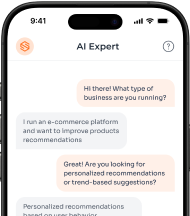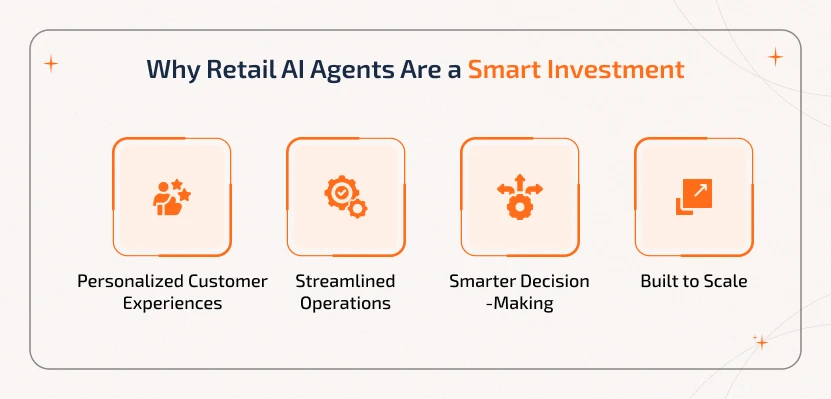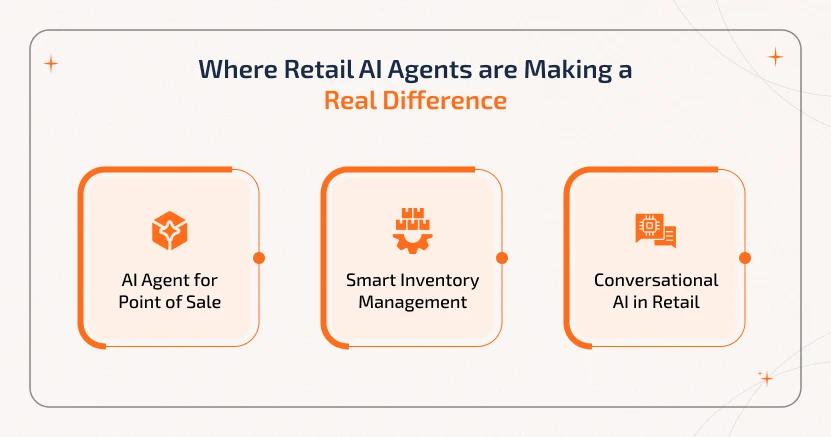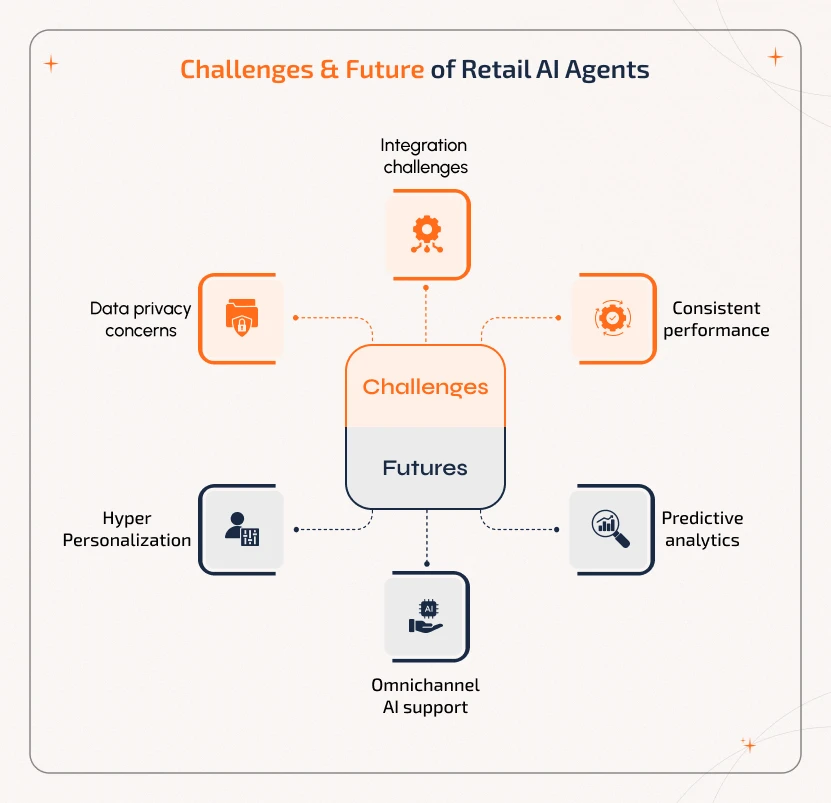Artificial Intelligence (AI) has made its mark in every field, and the retail industry is no exception. The retail AI agent is emerging as a game-changer, and hence, retailers are relying on intelligent systems to meet evolving customer expectations and overcome operational challenges. Therefore, knowing how to build a retail AI agent- from understanding its role to integrating it across retail platforms - is vital for businesses to stay ahead in today's competitive market.
Whether it's AI in retail sales optimization, intelligent customer engagement, or real-time inventory updates, AI agents are working as digital partners and providing better sales and smoother operations.
With retail shifting towards hyper-personalization and automation, AI agents are becoming an essential entity for brands looking to lead and not lag. In this guide, you will get to know everything - from its definition, role, advantages, steps to build a retail AI agent, use cases, and what lies ahead in detail.
Decoding the Retail AI Agent
For those who want to understand what a retail AI agent is all about, think of it as an extended version of a basic chatbot. It is a smart, responsive system capable of understanding shopper behavior, offering personalized product recommendations, automating support, and connecting effortlessly with your retail workflows.
Why Do Retail AI Agents Matter?
Whether you want to build an AI agent for online stores or in-store, they make retail smarter, faster, and more personal. Here is how retail AI agents add value:
1. Virtual Shopping Assistant
Works like a personal shopper online—offering users choices, suggesting products, and creating a buying guide.
2. Retail AI Chatbot
Handles customer queries, processes returns, collects feedback, and improves customer satisfaction 24/7.
3. AI-Powered Retail Assistant
Works inside physical stores to help customers navigate aisles, find deals, and receive personalized promotions.
Experience how our AI agents work across sales, customer service, & inventory management.

Why Retail AI Agents Are a Smart Investment
If you want to experience a strategic advantage in every part of your business, consider integrating AI agents into retail. The key advantages are as follows:

1. Personalized Customer Experiences
Retail agents recommend the right product at the right time by analyzing shopper behavior and preferences.
2. Streamlined Operations
Agents automate repetitive tasks, such as restocking alerts, return processing, and basic customer service.
3. Smarter Decision-Making
Get real-time analytics and trends to make faster, data-driven decisions. This way, the agents eliminate guesswork.
4. Built to Scale
Whether you're a startup or scaling your business across multiple locations, AI agents grow with you seamlessly.
How to Build a Retail AI Agent – Easy Steps
Building a retail AI agent is not a complex process when you have a simple-to-follow breakdown.
Step 1: Define Clear Goals
The first step is to define what you want your AI agent to do. This may range from enhancing customer support to increasing sales and optimizing inventory management.
Step 2: Pick the Right Tech Stack
Choosing the right AI Retail automation software and platforms that align with your business needs matters. Select the tech stack for scalability, integration, & ease of use.
Step 3: Train Your AI with Quality Data
Ensure you train your retail AI agent to understand and respond intelligently. For this, train it using historical sales, customer interactions, and inventory data.
Step 4: Connect to Your Retail Systems
The next step is to integrate the agent into your existing CRM, POS, and inventory tools. This ensures it works across your operations without any complications.
Step 5: Test, Re-Train, & Launch
Run real-world tests and gather feedback to fine-tune your AI. After re-training, deploy it at full scale to drive measurable results.
Talk to our AI experts to explore the right solution for your business goals and customer needs.
Where Retail AI Agents are Making a Real Difference
Get to know how the AI agents are actually reshaping the retail experiences:

1. AI Agent for Point of Sale (POS) Systems
An AI agent at POS is not just scanning items. Rather, it is applying personalized discounts, managing transactions, and improving customer service, etc. This way, it turns every transaction into a smart interaction.
2. Smart Inventory Management
With real-time data and predictive analytics, there is no guesswork involved. Retail AI agents will forecast demand, reduce stockouts, and automate re-ordering.
3. Conversational AI in Retail
Create an AI agent for retail to chat with customers like trained staff both online and in-store. This includes answering questions, helping them choose the right product, etc., 24/7.
Understanding the Costs of Retail AI Agents
The cost of developing a retail AI agent can vary based on the complexity, features, and deployment. The key factors businesses must consider when preparing the budget are as follows:
1. Development Costs - On partnering with an AI agent development company, the development cost covers the expenses related to designing, training, and programming the AI agent.
2. Integration Costs - This covers additional customization and resource costs that ensure seamless compatibility with your existing POS, CRM, and e-commerce systems.
3. Maintenance Costs - To ensure the AI agent delivers value, you should budget for ongoing updates, system monitoring, and performance tuning.
Although the initial cost of an AI agent seems higher, the long-term return on investment is significant. Retail AI agents are driving measurable results—from boosting sales to automating repetitive tasks and reducing manual workload.
Discover what it takes exactly to build your AI retail agent - from cost to timeline and deployment.
Overcoming Challenges & Embracing the Future of Retail AI Agents

Integrating retail AI agents does come with certain challenges, and some of them include:
- Data privacy concerns
- Integration complexities
- Consistent performance
The future of retail AI is promising, and the emerging trends include:
- Hyper-personalized AI retail experience with real-time recommendations across channels
- Omnichannel integration support where AI agents are available online, in mobile apps, and in-store
- Predicting buyer behavior and optimizing stock levels using predictive analytics
Why Choose Sparkout Tech for Retail AI Agent Development?
Partnering with the right AI agent development company makes all the difference in the success of your retail automation strategy. Here is why businesses trust Sparkout Tech for retail AI agent development:
1. Expertise in building retail AI solutions tailored to your business.
2. Customized development approach that aligns with your business goals, customer expectations, and brand voice.
3. We offer seamless integration support with existing POS, CRM, and e-commerce platforms.
4. With continuous, ongoing maintenance and support, we ensure your AI agent evolves with your business.
With expertise in retail AI agent development, we deliver scalable, ethical, and customized solutions.
Conclusion
Retail AI agents are changing the retail landscape by streamlining operations, personalizing customer interactions, and driving business decisions. By partnering with an experienced AI agent development company, businesses can unlock the power of AI to boost efficiency and increase sales. Whether you are starting or scaling your digital transformation, the right AI agent platform brings long-term success.






